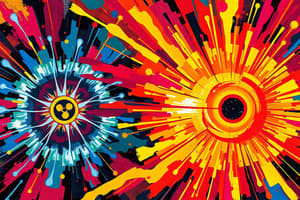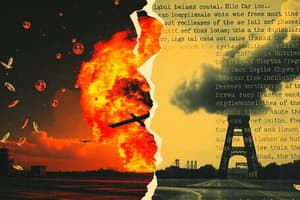Podcast
Questions and Answers
Nuclear chemistry is the study of the structure of atomic nuclei and changes the they undergo. It deals with ______ reactions or reactions that happen inside atoms.
Nuclear chemistry is the study of the structure of atomic nuclei and changes the they undergo. It deals with ______ reactions or reactions that happen inside atoms.
nuclear
Atomic nuclei can change into new nuclei through ______.
Atomic nuclei can change into new nuclei through ______.
nuclear reactions
Chemical reactions occur when bonds are broken, while ______ reactions involve changes in atomic nuclei.
Chemical reactions occur when bonds are broken, while ______ reactions involve changes in atomic nuclei.
nuclear
Radioactive decay rates are influenced by factors such as ______, particle size, and concentration.
Radioactive decay rates are influenced by factors such as ______, particle size, and concentration.
When cosmic rays collide with particles in the earth’s atmosphere, they create a cascade of secondary particles that can be detected by scientists on the ground. This process involves ______ processes.
When cosmic rays collide with particles in the earth’s atmosphere, they create a cascade of secondary particles that can be detected by scientists on the ground. This process involves ______ processes.
Because each of these neutrons can induce further fission, a chain reaction is possible. If the reaction can be controlled so that only a limited number of the neutrons released are allowed to induce additional decays, controlled fission can be used to generate electricity. Fusion involves the merging of nuclei where two light nuclei combine to form a single heavier nucleus. This process does not occur under standard conditions because ______ repels ______.
Because each of these neutrons can induce further fission, a chain reaction is possible. If the reaction can be controlled so that only a limited number of the neutrons released are allowed to induce additional decays, controlled fission can be used to generate electricity. Fusion involves the merging of nuclei where two light nuclei combine to form a single heavier nucleus. This process does not occur under standard conditions because ______ repels ______.
Advantages of fusion compared to fission include being inexpensive and generating nonradioactive waste. However, fusion also has its disadvantages, such as requiring a large amount of energy to start and being difficult to control. Examples of fusion applications include energy output of stars, the hydrogen bomb, and potential future nuclear power plants. Another application of fusion is the _______ of lighter nuclei to form heavier ones.
Advantages of fusion compared to fission include being inexpensive and generating nonradioactive waste. However, fusion also has its disadvantages, such as requiring a large amount of energy to start and being difficult to control. Examples of fusion applications include energy output of stars, the hydrogen bomb, and potential future nuclear power plants. Another application of fusion is the _______ of lighter nuclei to form heavier ones.
Applications of radioisotopes include their use in medicine for chemotherapy, power pacemakers, and as diagnostic tracers. In agriculture, radioisotopes are utilized to irradiate food and as pesticides. In terms of energy production, radioisotopes play a role in both fission and fusion processes. One common application of radioisotopes is the X-ray examination of luggage at a security station, which utilizes ________ radiation.
Applications of radioisotopes include their use in medicine for chemotherapy, power pacemakers, and as diagnostic tracers. In agriculture, radioisotopes are utilized to irradiate food and as pesticides. In terms of energy production, radioisotopes play a role in both fission and fusion processes. One common application of radioisotopes is the X-ray examination of luggage at a security station, which utilizes ________ radiation.
Radioactive iodine is used in medical imaging to visualize the thyroid gland. This process involves the ________ of the thyroid gland using radioactive iodine.
Radioactive iodine is used in medical imaging to visualize the thyroid gland. This process involves the ________ of the thyroid gland using radioactive iodine.
Another medical imaging technique involves using γ-ray scans to visualize human lungs. This process is known as ________ of human lungs.
Another medical imaging technique involves using γ-ray scans to visualize human lungs. This process is known as ________ of human lungs.
When a cancer patient receives radiation therapy, they are undergoing treatment that involves the targeted use of ________ to destroy cancer cells.
When a cancer patient receives radiation therapy, they are undergoing treatment that involves the targeted use of ________ to destroy cancer cells.
Nuclear reactions occur when nuclei emit particles and/or rays Atoms often converted into atoms of another element. May involve protons, neutrons, and ______. Associated with large energy changes.
Nuclear reactions occur when nuclei emit particles and/or rays Atoms often converted into atoms of another element. May involve protons, neutrons, and ______. Associated with large energy changes.
Reaction rate is not influenced by temperature, particle size, concentration, etc. There are 7 types of radiation: Alpha, Beta, ______.
Reaction rate is not influenced by temperature, particle size, concentration, etc. There are 7 types of radiation: Alpha, Beta, ______.
Alpha particles are the same as helium nuclei, while Beta particles are the same as an electron e-. Alpha particles have a charge of 2+ and a mass of ______.
Alpha particles are the same as helium nuclei, while Beta particles are the same as an electron e-. Alpha particles have a charge of 2+ and a mass of ______.
Gamma radiation is a high-energy electromagnetic radiation with an approximate energy of 1 MeV and high penetrating power. Effective shielding includes lead and ______.
Gamma radiation is a high-energy electromagnetic radiation with an approximate energy of 1 MeV and high penetrating power. Effective shielding includes lead and ______.
Radioactive decay is the process by which an unstable atomic nucleus loses energy by radiation. It includes 5 types of decay: Alpha, Beta, Gamma, Electron capture, and ______ emission.
Radioactive decay is the process by which an unstable atomic nucleus loses energy by radiation. It includes 5 types of decay: Alpha, Beta, Gamma, Electron capture, and ______ emission.
When a nucleus undergoes alpha decay, it ejects an alpha particle, leading to a decrease in mass number by 4 and atomic number by ______.
When a nucleus undergoes alpha decay, it ejects an alpha particle, leading to a decrease in mass number by 4 and atomic number by ______.
Flashcards are hidden until you start studying
Study Notes
Nuclear Reactions and Radioisotopes
- A chain reaction is possible when neutrons induce further fission, and controlled fission can be used to generate electricity if the reaction is controlled to limit the number of neutrons released.
- Fusion occurs when two light nuclei combine to form a single heavier nucleus, but it doesn't occur under standard conditions due to the repulsive forces between nuclei.
Advantages and Disadvantages of Fission and Fusion
- Advantages of fusion: inexpensive and non-radioactive waste.
- Disadvantages of fusion: requires a large amount of energy to start, and difficult to control.
Applications of Radioisotopes
- Medicine: chemotherapy, power pacemakers, diagnostic tracers.
- Agriculture: irradiate food, pesticide.
- Energy: fission, fusion.
- Other applications: X-ray examination, imaging of thyroid gland and human lungs, radiation therapy.
Nuclear Reactions
- Nuclear reactions occur when nuclei emit particles and/or rays, converting atoms into atoms of another element.
- These reactions involve protons, neutrons, and electrons, and are associated with large energy changes.
- The reaction rate is not influenced by temperature, particle size, concentration, etc.
Types of Radiation
- Alpha particles: same as helium nuclei, 2+ charge, 4 mass, approximate energy, low penetrating power, can be shielded with paper or clothing.
- Beta particles: same as an electron, 0 charge, 1/1837 mass, approximate energy, moderate penetrating power, can be shielded with metal foil.
- Gamma radiation: high-energy electromagnetic radiation, 0 charge, 0 mass, approximate energy, high penetrating power, can be shielded with lead or concrete.
Radioactive Decay
- Radioactive decay is the process by which an unstable atomic nucleus loses energy by radiation.
- Types of radioactive decay: alpha decay, beta decay, gamma decay, electron capture, positron emission.
Alpha Decay
- When a nucleus undergoes alpha decay, it ejects an alpha particle, decreasing its mass number by 4 and its atomic number by 2.
- Alpha particles can originate from the sun, supernova, black holes, or other high-energy sources in the universe.
Nuclear Chemistry
- Nuclear chemistry is the study of the structure of atomic nuclei and the changes they undergo.
- It deals with nuclear reactions or reactions that happen inside atoms, and atomic nuclei can change into new nuclei.
- Nuclear reactions are different from chemical reactions, which involve changes in valence electrons and are associated with small energy changes.
Studying That Suits You
Use AI to generate personalized quizzes and flashcards to suit your learning preferences.




